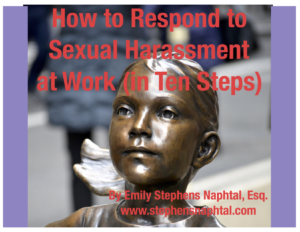Title IX Back to School Basics
Headed back to school this week? Here are some important back-to-school basics about your rights under Title IX, the federal law that prohibits sex discrimination in education. Passed in 1972, the main text of the law reads as follows:
“No person in the United States shall, on the basis of sex, be excluded from participation in, be denied the benefits of, or be subjected to discrimination under any education program or activity receiving Federal financial assistance.” 20 U.S.C. § 1681.
Who does Title IX cover?
Title IX is broad. It covers all educational institutions that receive funding from the Federal government. It also covers all persons involved with these institutions, including students, applicants, teachers, and staff members.
Enforcement
The Department of Education Office for Civil Rights (“OCR”) has Title IX enforcement authority. It can issue regulations and guidance on interpreting the statute as well as undertake investigations and dole out punishments. Theoretically, the Department of Education could go as far as withdrawing an educational institution’s Federal funding, though that rarely, if ever, occurs. People who have suffered sex based discrimination can alert the Department of Education by filing a complaint on its website within 180 days of a discriminatory event. If they decide to report the discrimination to their school, they can wait to notify OCR until 60 days after the conclusion of the school’s internal investigation and adjudication.
Courts have also held that Title IX confers a private right of action. See Cannon v. University of Chicago, 441 U.S. 677 (1979). This means that those who have suffered from discrimination or retaliation at their school can go directly to federal court to enforce their rights. This might often be a better option for individual students and employees because through a court they have more control, can win monetary damages and attorney’s fees (not subject to the caps of Title VII), can procure injunctions, and have a longer period of time to bring their claims. Since, Title IX does not explicitly state a statute of limitations, it varies by state. Right now, targets of discrimination have three years to bring their Title IX claims in New York and two years in New Jersey.
Athletics
Most people who recognize Title IX associate it with female sport. Specifically, Title IX mandates that schools provide male and female student-athletes with equivalent opportunities to participate in sports, including equal opportunities to obtain athletic scholarships. Further, female and male sports teams must have equivalent facilities, equipment, travel funding, uniforms, housing, and scheduling of practice and games.
Since its passage in 1972, Title IX has had a drastic impact on female athletes. For example, when the law took effect, fewer than 300,000 U.S. girls played high school sports; in 2011, more than 3.1 million U.S. girls played high school sports.
Women have made similar gains in college and Olympic athletics. For example, at the 2012 Olympics in Beijing, the United States won 104 medals, the most of any country. U.S. women won 58 of those medals, or 56%. Studies have shown that internationally, one of the surest ways for countries to increase their Olympic medal count is to focus on gender equality.
Unfortunately, Title IX has not been able to effectively usher women into the U.S.’s profitable, popular, and male-dominated professional sports industries.
Sexual Harassment and Assault
In the 1990s, the Supreme Court affirmed that Title IX prohibits sexual harassment and assault. See Franklin v. Gwinnett County Public School, 503 U.S. 60 (1992); Gebser v. Lago Vista Indep. Sch. Dist., 524 U.S. 274, (1998); Davis Next Friend Lashonda D. v. Monroe Cty. Bd. of Educ., 526 U.S. 629 (1999).
Courts largely use the Title VII employment law framework for Title IX cases. See Papelino v. Albany Coll. of Pharmacy of Union Univ., 633 F.3d 81, 89 (2d Cir. 2011). However, schools do not have the Faragher Ellerth affirmative defense employers can invoke to show they had and used adequate procedures to respond to sexual harassment. Instead, educational institutions may be held liable for “deliberate indifference to known acts of harassment.” Monroe at 643.
The Obama Department of Education (“DoE”) increased Title IX enforcement of sexual assaults on college campuses. Most notably, in 2011, it released a “Dear Colleague” Letter which detailed how it believed Universities should respond to sexual assault complaints. This effort sparked controversy. The Trump DoE’s Betsy DeVos vows to overhaul the requirements detailed in the 2011 letter.
For the moment, despite these administration shifts, the law remains largely the same. Universities have the duty to respond promptly and effectively to accusations of sexual harassment and violence. If victims do not believe their Universities responded effectively to their complaints, or they want monetary relief for their injuries, they can enforce their rights in Federal Court.
Pregnancy and Family Responsibility
Pregnancy and family responsibility discrimination also falls under Title IX’s sex discrimination prohibition. Pregnant students must have equal access to school, activities, and services provided for temporarily disabled students. Schools must also excuse student’s absences for as long as a doctor deems necessary. Critically, schools must allow students (and teachers, and administrators) to return to their programs and make up any missed work.
Graduate students and professors should be especially aware of Title IX’s protections. When faculty or advisors deter female academics from pursuing tenure track positions because of pregnancy or assumed family responsibilities, they violate Title IX. Similarly, when universities refuse to pause the tenure clock for pregnant professors, they violate Title IX.
LGBTQ
Federal discrimination protections for LGBTQ individuals are still evolving in Agencies and Courts. Multiple courts, including the Seventh Circuit Court of Appeals, have ruled that “sex discrimination” includes discrimination based on gender identity and sexual orientation. The Second Circuit will hear oral argument on the issue later this month. While these cases focus on employment discrimination under Title VII, they will likely have an impact on Title IX as well.
Because the Department of Education wields more power than its employment law equivalent, the Equal Employment Opportunity Commission, the change in administration from Obama to Trump has had a more substantial effect on Title IX enforcement for LGBTQ individuals. Under Obama, the Department released a “Dear Colleague” Letter describing how institutions should protect LGBTQ people. The Trump DoE retracted this letter early in its tenure. Because of this retraction, the Supreme Court declined to hear a case about whether, under Title IX, a transgender student should be able to access his preferred bathroom.
Retaliation
Title IX protects not only those who have experienced sex-based discrimination but also those who speak out about it on campus and/or file complaints. See Jackson v. Birmingham Bd. of Educ., 544 U.S. 167, 174 (2005). This means that an institution cannot fire or otherwise mistreat students, teachers, coaches, or administrators for opposing sex discrimination. In addition, after someone complains, schools must ensure that the person accused of the Title IX violation and other third parties do not retaliate against the complainant.
In one high profile example of illegal Title IX retaliation, Harvard denied tenure to Kimberly Theidon, a lauded associate professor who vocally defended sexual assault survivors on campus. Now, Theidon is a tenured professor at Tufts Fletcher School of Law and Diplomacy. Her case against Harvard is still ongoing, but Theidon’s temerity might inspire other professors to speak out against sex discrimination and vindicate their rights.
Thanks for reading.
Please subscribe to receive more helpful discrimination law tips.






